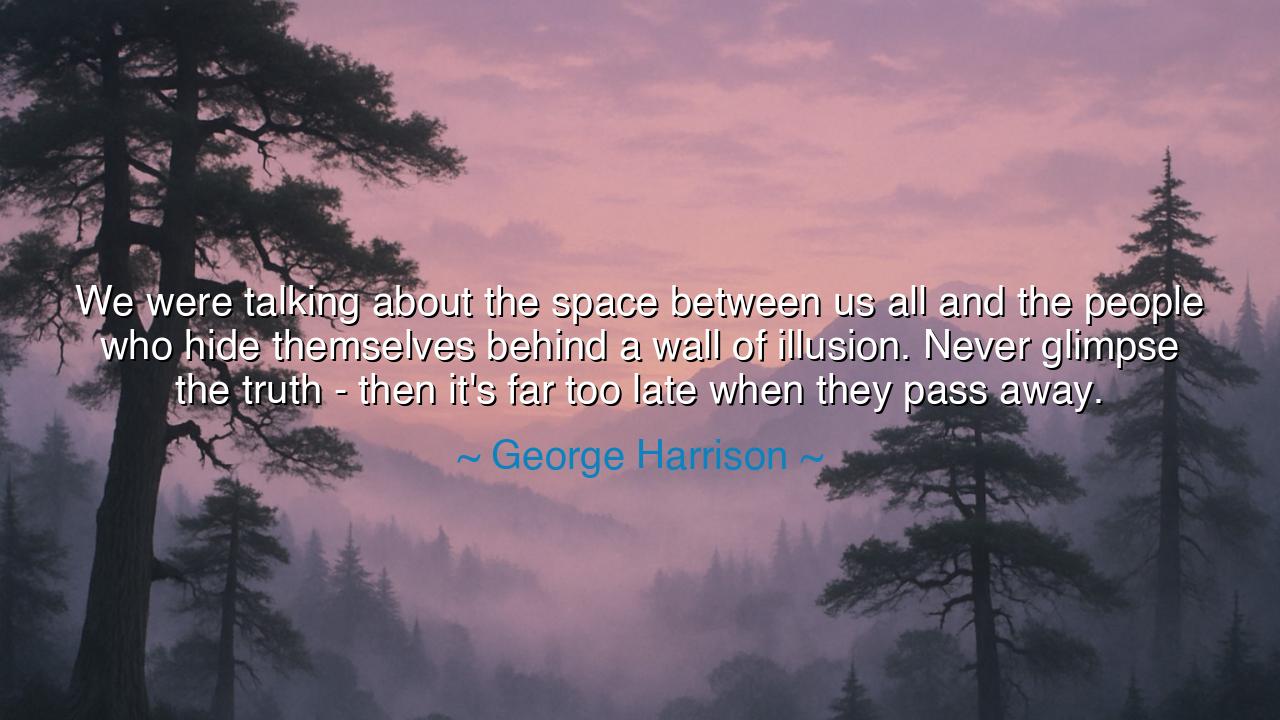
We were talking about the space between us all and the people who
We were talking about the space between us all and the people who hide themselves behind a wall of illusion. Never glimpse the truth - then it's far too late when they pass away.






George Harrison, the quiet Beatle, gave us a line that trembles with both longing and warning: “We were talking about the space between us all and the people who hide themselves behind a wall of illusion. Never glimpse the truth—then it’s far too late when they pass away.” In these words, he reaches beyond music into the realm of the eternal. They are not merely lyrics; they are a meditation on the barriers that divide the human heart and the tragedy of never breaking them before life’s end.
The meaning of this wisdom is layered with sorrow. The space between us is not measured in miles or oceans but in the distance of spirit—the silences, the fears, the illusions that prevent true communion. Many people, in their pride or in their pain, build walls around themselves. They mask their vulnerability, they cling to appearances, they live within illusions of success, control, or indifference. Yet Harrison warns: when the truth is hidden too long, when love is left unspoken and authenticity denied, death comes—and then reconciliation can never be found.
History has shown us this tale in many forms. Consider the story of Emperor Marcus Aurelius and his son Commodus. The father, philosopher and stoic, longed for wisdom to pass to the son; but the son, veiled in his illusions of grandeur, never truly listened. When the father passed away, the empire fell into decline, and the distance between them—never bridged in life—became a wound upon Rome. The space between them was not of blood, but of spirit, and it proved deadly.
On the gentler side, there is also the story of reconciliation. Nelson Mandela, after decades in prison, might have chosen bitterness and walls of illusion. Instead, he chose truth and openness. He spoke to his enemies with candor, tore down barriers, and transformed the space between races into a bridge toward peace. His life is proof that when one refuses to hide behind walls, even vast divisions can be healed before it is too late.
The deeper wisdom in Harrison’s words is that illusions, though comforting, are prisons. To live behind them is to live half a life, safe from rejection perhaps, but also safe from love, safe from truth, safe from the beauty of connection. When death comes, as it comes for all, the chance to speak honestly, to love deeply, to forgive freely, is lost forever. Thus, the tragedy is not merely in dying, but in dying unseen, unknown, unreconciled.
The lesson is clear: do not wait until the end to break the walls of illusion. Do not let pride, fear, or shame keep you apart from others. Seek the truth now, even if it wounds, for only in truth can healing come. The space between us need not remain a void; it can be transformed into sacred ground where souls meet without masks. Better an awkward truth today than eternal silence tomorrow.
Practical action is this: speak honestly to those you love while you can. Reconcile with estranged friends, forgive where you can, express gratitude, share your heart openly. Live in such a way that no one will need to wonder what you felt when you are gone. Let your walls fall, and let the space between you and others be filled not with illusion, but with understanding and light.
So let Harrison’s words endure as a hymn for the ages: beware the space filled with illusions, for when death comes, it is too late to seek the truth. May we take them as a call to courage, to openness, and to love. For only when we dare to see and be seen will the walls fall, and the space between us all become not emptiness, but unity.






AAdministratorAdministrator
Welcome, honored guests. Please leave a comment, we will respond soon